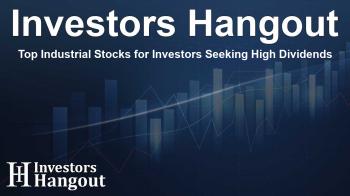Top Industrial Stocks for Investors Seeking High Dividends

Understanding High-Yield Dividend Stocks
In a fluctuating market, dividend-yielding stocks often attract investors looking for stability. These stocks represent companies with strong cash flows that reward shareholders through consistent dividend payouts.
Highlights on Top Industrial Stocks
Let’s delve into three prominent stocks in the industrial sector known for their attractive dividend yields.
United Parcel Service, Inc. (UPS)
- Dividend Yield: 6.50%
- Analysts from UBS have reaffirmed a Buy rating while adjusting the price target from $128 to $124, reflecting a 71% accuracy rate.
- Oppenheimer analysts have maintained an Outperform rating, revising the price target down from $126 to $114, showing a 65% accuracy.
- Recent Developments: UPS is actively enhancing its efficiency and cost management strategies to improve profitability.
Karat Packaging Inc. (KRT)
- Dividend Yield: 6.40%
- Truist Securities has maintained a Hold rating, increasing the price target from $28 to $31 with a 75% accuracy.
- Analysts at William Blair have downgraded their rating from Outperform to Market Perform, with an accuracy of 67%.
- Latest News: Karat Packaging has recently priced a secondary offering of 1.5 million shares at $27 per share.
Copa Holdings, S.A. (CPA)
- Dividend Yield: 5.86%
- TD Cowen has sustained a Buy rating while lowering the price target from $145 to $130, demonstrating a 66% accuracy.
- Deutsche Bank analysts have also maintained a Buy status but have slashed their price target from $145 to $130, with a 73% accuracy.
- Upcoming Events: Copa Holdings is expected to announce its second-quarter results soon.
Investment Insights
Investors should consider these companies as potential additions to their portfolios given their capable management and consistent dividend yields. Evaluating the latest analyst insights can aid in making informed decisions.
Performance Metrics
When analyzing stocks like UPS, KRT, and CPA, consider not just the dividend yield but also the company's overall performance in navigating economic challenges. The focus on internal efficiencies can signal robust management practices and strengthening market positions.
Frequently Asked Questions
What is a dividend yield?
Dividend yield is a financial ratio that shows how much a company pays in dividends each year relative to its stock price.
Why should I invest in dividend-yielding stocks?
Investing in dividend stocks can provide a steady income stream and contribute to overall portfolio stability.
How do analysts rate stocks?
Analysts provide ratings based on thorough research of the company’s financial health, market conditions, and other relevant factors.
What is a good dividend yield?
A good dividend yield typically ranges between 4% to 6%, depending on market conditions and sector performance.
How can I stay updated on stock performance?
Utilizing stock monitoring tools and platforms like real-time news feeds can keep investors informed about performance and changes in analyst ratings.
About The Author
Contact Ryan Hughes privately here. Or send an email with ATTN: Ryan Hughes as the subject to contact@investorshangout.com.
About Investors Hangout
Investors Hangout is a leading online stock forum for financial discussion and learning, offering a wide range of free tools and resources. It draws in traders of all levels, who exchange market knowledge, investigate trading tactics, and keep an eye on industry developments in real time. Featuring financial articles, stock message boards, quotes, charts, company profiles, and live news updates. Through cooperative learning and a wealth of informational resources, it helps users from novices creating their first portfolios to experts honing their techniques. Join Investors Hangout today: https://investorshangout.com/
The content of this article is based on factual, publicly available information and does not represent legal, financial, or investment advice. Investors Hangout does not offer financial advice, and the author is not a licensed financial advisor. Consult a qualified advisor before making any financial or investment decisions based on this article. This article should not be considered advice to purchase, sell, or hold any securities or other investments. If any of the material provided here is inaccurate, please contact us for corrections.

